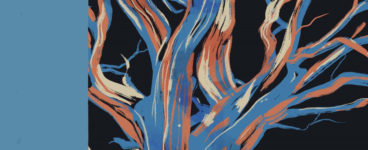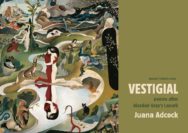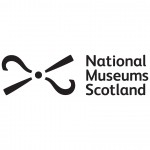‘But reading Lanark while going on these lockdown walks…the city looked completely different. I noticed things I’d never seen before.’
Scottish-Mexican poet Juana Adcock’s latest pamphlet, Vesitigial, is a collection of poems written after Alasdair Gray’s seminal work, Lanark. It was published in June by Stewed Rhubarb Press.
Vestigial
By Juana Adcock
Published by Stewed Rhubarb Press
Vestigial is a commissioned body of poems. How did the original commission come about and when did you write it?
I was commissioned to write a response to Lanark during the first two lockdowns, as part of the first Alasdair Gray conference and as a creative response to go alongside the academic papers. It took six months or a year to finish writing. I hadn’t read Lanark until the first lockdown. Before I’d started reading it, I’d thought about leaving Glasgow. I felt the city wasn’t working for me – typical lockdown crisis! But reading Lanark while going on these lockdown walks…the city looked completely different. I noticed things I’d never seen before. The original commission was just for one poem, but there were so many layers of stories, t was so hard to condense that into a single poem. I don’t know how anyone could have done that. It’s huge, anarchic, a labyrinth.
What was the response when you produced a pamphlet instead of a single poem?
I think Rodge Glass [Strathclyde University, Chair of the Alasdair Gray Conference Committee] was like ‘are you okay? Are you sure you’re not overextending yourself?’ I kept thinking, maybe I can write lots of different drafts and then choose one poem to focus on, the best one, and send that off. But I couldn’t choose. I just sent it off as lots of different poems. I presented it at the conference on Zoom, read a couple of poems, and then found a home for it a year or so later.
I suppose that shows just how much you connected to Lanark.
I found it really generative and it really did give me all these different ideas. It wasn’t just reading the book – I wrote to the Alasdair Grey Archive and asked if I could go. It was during a lockdown, so me for it was a huge adventure to get on a bus and go all the way to Maryhill! They were so generous. I was shown all these drafts, his own library, notes he’d added to books. If he wanted to correct something, he would add liquid paper and a Post It note, then write on that. Everything had all these layers. It connected me to a story Rodge told me – Alasdair Gray painted a mural for a church that was due to be demolished. He painted this elaborate mural, even when he knew the church wouldn’t exist for much longer. It made me think about the creative process in a different way – it’s about the process, not the end results.
What was it like at the archive?
It’s beautiful – it looks like it could have been his living room. There’s furniture from his flat, his original desk, bookshelves filled with his actual books. You actually feel that you’re in his space.
How did that feel as a writer, going into his space?
It was really somehow liberating. You get the feeling he was not some god that was out there making this consecrated art – he was a struggling artist, always skint, having to improvise with whatever elements he had around him. I was shown a notebook he rescued from a skip, this old accounting book he’d used as a sketchbook.
You’ve got your own collections of poetry out; what was it like, producing work written entirely after someone else? Did you feel any pressure?
I was worried I would be departing too far from Lanark. I kept wondering if I should include more recognisable elements or incorporate more classic scenes or bring in characters. But then I thought, no. What I think I’m responding to is his vision of the creative process, rather than the novel’s actual plot or its content. I was trying to get nearer to the way he thinks. I find that the most fascinating part of connecting with anyone’s work.
Quite often poets write in response to other poets, or poems, or artwork. What was it like writing poetry in response to a novel?
A narrative element came into the poetry, I feel. I was trying to think of poems but kept thinking about different stories. I could have kept going, writing loads of narrative poems, but I had to stop at some point! In classic Unthank style, it’s all a fight against bureaucracy and how powerless one is against the system. I did end up visiting art galleries and looking at the physicality of paintings, and thinking about the physicality of the archives though.
I think physicality really comes through with the different forms you use in Vestigial. ‘After Eden’ and its use of footnotes feels like those layers of Post It notes you saw in the archive. How did you find the forms you use?
There was a lot of stream of consciousness, scribbling away or typing away. Then when I’d look back at drafts I’d notice form, which I’d been thinking about a bit. In ‘My chi moves like arrows’, I use a lot of ‘<’, which looks like an actual arrow. It’s a math sign, also used in coding. When I switch my keyboard between English and Spanish, sometimes when I try and write a comma, < appears instead. So, I decided to make it part of the form, and it matches the theme of arrows, and the image of St Sebastian and his arrow wounds.
There are different languages at play in these poems too.
Yeah, there’s English, Spanish, a little Persian, and Dutch. It was always just a conglomeration of whatever was going on on my screen at the time. Usually when I’m writing drafts, probably half will be Spanish, some will be Spanglish, some English. There’s always an anarchy of languages going on that I have to go back and tidy up.
You’ve also invented your own definitions, the work is punctuated with these meanings of ‘vestigial’.
That was a last minute addition! All these poems without titles were going to be called ‘Vestigial’, but I didn’t like the word floating on the page on its own. So, I made these fake definitions and connected them to the poems. I liked the idea of creating these literary spaces where you can imagine a different reality where a certain word means something else. Similar, I suppose, to Unthank.
Vestigial by Juana Adcock is published by Stewed Rhubarb Press, priced £5.99.
ALSO IN THIS ISSUE

 be/longing: A Q & A with Amanda Thomson
be/longing: A Q & A with Amanda Thomson
‘I also held questions about the identities we perhaps each hold in a myriad of ways, and what it me …

 Seasonality
Seasonality
‘It is about what I see, what I hear and what I feel as I observe the ever-changing beauty that surr …













